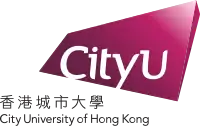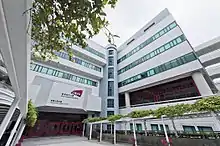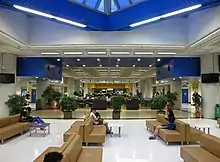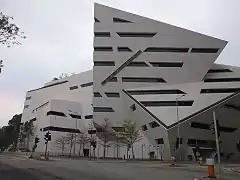City University of Hong Kong
City University of Hong Kong (CityU) is a public research university in Kowloon, Hong Kong. It was founded in 1984 as City Polytechnic of Hong Kong and became a fully accredited university in 1994.
香港城市大學 | |
 | |
Other name | CityU |
|---|---|
| Motto | Officium et Civitas |
| Type | Public |
| Established | 1 January 1984 (as City Polytechnic of Hong Kong) 1994 (full university status) |
Academic affiliations | |
| Chairman | Lester Garson Huang |
| Chancellor | Carrie Lam (as Chief Executive of Hong Kong) |
| President | Way Kuo |
Academic staff | 845 |
| Undergraduates | 12,676 |
| Postgraduates | 5,906 |
| Location | |
| Campus | Urban, 15.6 hectares (0.156 km2) |
| Language | English |
| Colours | Bold burgundy |
Sporting affiliations | USFHK |
| Website | www |
| [1][2] | |
| City University of Hong Kong | |||||||||||||||
|---|---|---|---|---|---|---|---|---|---|---|---|---|---|---|---|
| Traditional Chinese | 香港城市大學 | ||||||||||||||
| Simplified Chinese | 香港城市大学 | ||||||||||||||
| Cantonese Yale | Hēunggóng Sìhngsíh Daaihhohk | ||||||||||||||
| |||||||||||||||
| University rankings | |
|---|---|
| Global – Overall | |
| ARWU World[3] | 201-300 (2020) |
| QS World[4] | 48 (2021) |
| THE World[5] | 126 (2021) |
| Regional – Overall | |
| QS Asia[6] | 18 (2021) |
| THE Asia[7] | 16 (2020) |
The university has nine main schools offering courses in business, science, engineering, liberal art, social sciences, law and Veterinary Medicine, along with Chow Yei Ching School of Graduate Studies, CityU Shenzhen Research Institute, and Hong Kong Institute for Advanced Study.
History
City University's origins lie in the calls for a "second polytechnic" in the years following the 1972 establishment of the Hong Kong Polytechnic. In 1982, Executive Council member Chung Sze-yuen spoke of a general consensus that "a second polytechnic of similar size to the first should be built as soon as possible."[8] District administrators from Tuen Mun and Tsuen Wan lobbied the government to build the new institution in their respective new towns.[8] The government instead purchased temporary premises at the new Argyle Centre Tower II in Mong Kok, a property developed by the Mass Transit Railway Corporation in concert with the then-Argyle station. The new school was called City Polytechnic of Hong Kong, a name chosen among nearly 300 suggestions made by members of the public.[9]
The new polytechnic opened on 8 October 1984, welcoming 480 full-time and 680 part-time students.[10] The provision for part-time students contributed to high enrolment, with the quota being filled almost immediately.[10]
The architectural contract to design the new campus was won by Percy Thomas Partnership in association with Alan Fitch and W.N. Chung.[11] It was originally slated to open by October 1988.[12] The first phase was officially opened by Governor Wilson on 15 January 1990, and boasted 14 lecture theatres and 1,500 computers.[13] By 1991, the school had over 8,000 full-time students and approximately 3,000 part-time students.[14] The second phase of the permanent campus opened 1993.[11] The school achieved university status in 1994 and the name was changed accordingly.[15]
In April 2015 the university abruptly and controversially shut down its MFA programme in creative writing. Students and alumni launched a petition against the decision, while the faculty and noted international writers issued an open letter questioning the reasoning behind the closure.[16] Acclaimed Canadian novelist and faculty member Madeleine Thien, writing in The Guardian, was among those who attributed the decision to censorship and diminishing freedom of expression in Hong Kong.[17]
Campus

City University of Hong Kong occupies an urban campus located on Tat Chee Avenue, Kowloon Tong, Kowloon.[18] It is connected to Festival Walk shopping centre and Kowloon Tong station, which serves the East Rail line and Kwun Tong line of Hong Kong's Mass Transit Railway (MTR) system. It is also adjacent to Shek Kip Mei Park and Nam Shan Estate. The main campus covers around 15.6 hectares.
Yeung Kin Man Academic Building

Yeung Kin Man Academic Building, formerly known as Academic 1, was also called "teaching building" in 2006 or before.[19] It was completed in stages from 1989 to 1994. The floor area is 63,000 square metres, and includes 116 laboratories, 18 lecture halls, classrooms and canteens. The building is divided by colour, in order of purple zone (P), green zone (G), blue zone (B), yellow zone (Y) and red zone (R). Except for the lecture halls, all classrooms and laboratories are numbered by their colour divisions.
Li Dak Sum Yip Yio Chin Academic Building
Li Dak Sum Yip Yio Chin Academic Building, previously called Academic 2,[20] was designed by architecture firm Aedas. With a total area of 20,900 square metres, it is located on the slope behind the sports complex on the campus, and is equipped with a resource centre, design room, computer room, language practice room, and student dining hall, classrooms, lecture halls, audio-visual rooms, multi-purpose activity rooms and sky gardens.
Lau Ming Wai Academic Building
Lau Ming Wai Academic Building was called Academic 3.[21] The academic building project is divided into two phases. The first phase is a 20-storey high-rise building, and the second phase is a five-storey low-rise building with a total usable area of 20,500 square metres. It is the tallest building in CityU. Facilities include a 600-seat auditorium, classrooms, information technology laboratories, millimetre wave state key laboratories, restaurants, learning shared spaces, and administrative offices.[22] The building was designed by the Hong Kong architectural firm Ronald Lu & Partners. The third and sixth floors are connected to the Li Dak Sum Yip Yio Chin Academic Building, while the fifth to seventh floors are connected to the student dormitory and Shaw Creative Media Centre. There are also terrace gardens on the 6th, 7th and 8th floors.
Run Run Shaw Creative Media Centre

Run Run Shaw Creative Media Centre was completed in 2011.[23] It was designed by Daniel Libeskind cooperating with Leigh and Orange Ltd., and received several awards on its design.[24] The building houses the university's School of Creative Media, the Centre for Applied Computing and Interactive Media and the computer science, media and communication, and English departments.[25]
Jockey Club One Health Tower
Hu Fa Kuang Sports Centre was a five-storey sports centre which houses a multi-purpose hall and four practice gymnasiums for badminton, basketball, volleyball, martial arts and dance, and other activities. In May 2016, the sports hall roof collapsed due to the weight imposed by a new green roof placed on top.[26]
In November 2017, the university decided to rebuild the sport hall into the Jockey Club One Health Tower, which is expected to be completed in 2022.[27]
Governance
Established in 1984 under Chapter 1132 of the Laws of Hong Kong (City University of Hong Kong Ordinance),[28] CityU is one of the eight statutory universities in Hong Kong.
Like other statutory universities in Hong Kong, the chief Executive of Hong Kong acts as the chancellor of CityU. Prior to the Handover, this was a ceremonial title bestowed upon the governor of Hong Kong.
Council
The council is the supreme governing body of the University. The chief executive of Hong Kong has the power to appoint 15 of the 23 council members, seven of which are named directly and eight appointed upon recommendation of the council. The chief executive can also appoint the chairman, deputy and treasurer; the vice-chancellor is in turn appointed by the council.[29]
Senate
The senate serves as the supreme academic body of the university and is responsible for deciding and reforming the university's academic policies. It is mainly composed of academic staff members but also includes the two representatives of the Students' Union and an representative of CityU Postgraduate Association.[30]
Academic organisation
The university's teaching units are grouped under 10 colleges and schools, offering over 150 postgraduate, undergraduate taught programmes.[31]
| College of Business | College of Liberal Arts and Social Sciences | College of Engineering | College of Science | Jockey Club College of Veterinary Medicine and Life Sciences |
|---|---|---|---|---|
|
|
|
|
|
| School of Creative Media | School of Data Science | School of Energy and Environment | School of Law | Chow Yei Ching School of Graduate Studies |
Student life
Student residence
Student residences are located on Cornwall Street, near Lau Ming Wai academic building. They provide housing and recreational space for undergraduates and postgraduates. Among them, halls 1 to 9 were designed by the British firm RMJM, while halls 10 and 11 were designed by P&T Group. Most halls are named after donors:[32]
- Undergraduates: Jockey Club Humanity Hall (Hall 1), HSBC Prosperity Hall (Hall 2), Alumni Civility Hall (Hall 3), Jockey Club Academy Hall (Hall 4), Chan Sui Kau Hall (Hall 5), Lee Shau Kee Hall (Hall 6), Jockey Club Harmony Hall (Hall 7), Sir Gordon and Lady Ivy Wu Hall (Hall 9), Hall 10, Hall 11
- Research postgraduates: Yip Yuen Yuk Hing Hall (Hall 8), Jockey Club House
The university also provides off-campus accommodation and short term accommodation for non-local students.
Student clubs
Student clubs in CityU are diverse. There are more than 80 clubs from interest groups, residents’ associations and departmental Societies, along with cultural groups including orchestra, choir and debate teams.[33]
Sport teams
Sport teams are mentored by Student Development Services. In April 2017, they have extended their dominance in sports competitions by winning a record-breaking ninth Grand Slam in the 2016-2017 annual sports competitions.[34]
- Athletics
- Badminton
- Basketball
- Cross country
- Dragon boat
- Fencing
- Handball
- Karatedo
- Rugby
- Soccer
- Squash
- Swimming
- Table tennis
- Taekwondo
- Tennis
- Volleyball
- Woodball
- Water polo
Publications
City University of Hong Kong Press
City University of Hong Kong Press was founded in 1996 as the publishing arm of the university.[35]
It mainly publishes three types of publications: academic works, professional books, and books of general interest and social concern. The press focuses on China studies, Hong Kong studies, Asian studies, politics and public policy.
University publication
Alumni
- Christopher Cheung – CEO of Christfund Securities and legislative councillor[36]
- David Chung Wai-keung – undersecretary for Innovation and Technology Bureau[37]
- Kam Nai-wai – legislative councillor[38]
- Christine Loh – undersecretary for the environment[39]
- Bona Mugabe – daughter of former president of Zimbabwe and ZANU-PF leader, Robert Mugabe[40]
- Paul Tse – legislative councillor[41]
- Lau Kong-wah – undersecretary of the Constitutional and Mainland Affairs Bureau, former legislative councillor[42]
- Matthew Wong – noted painter[43][44]
Controversies
Collapse of roof of the sport hall
On 20 May 2016, the roof structure of a multi-purpose sports hall, named Chan Tai Ho Multi-purpose Hall (the Sports Hall), in Hu Fa Kuang Sports Centre (the Sports Centre) collapsed. Two staff members of CityU sustained minor injuries and a third individual was in shock in the incident. The venue was scheduled to hold the annual celebration banquet of CityU athletes on that night and 700 to 800 student athletes were supposed to attend.[45] The investigation report released by the Buildings Department said three factors contributed to the collapse - a leveled layer of material applied to the surface of the roof structure being thicker than the original design, the laying of greenery on the roof and large puddles of water.[46] CityU did not seek separate advice from an independent surveyor to conduct feasibility studies and designs before tendering out to consultants or contractors to carry out the project. The report issued by CityU investigation committee concluded that contractor of the green roof project held liable for the collapse of the roof at a sports centre, despite his repeated denial that he was involved in the work.[47] It was reported that CityU vice-president Sunny Lee Wai-kwong, who oversees the Campus Development and Facilities Office escaped liability, while technical staff would face disciplinary action.[47]
QS ranking dispute
In 2017 City University was accused of falsifying student data for a better ranking.[48][49] City University said they would submit the case to external audit firm to verify the data.[49]
City University of Hong Kong has been accused of providing misleading information to Quacquarelli Symonds (QS) to boost its university rankings. However, the QS review confirmed that the data submitted by CityU is accurate. In January 2018, CityU issued a statement stating that it had commissioned an accounting firm to complete an independent review of the student data declared by CityU and confirmed that it found no declarations that did not meet the scope of QS requirements.[50]
Chinese judges hold Communist Party meeting on campus
On October 20, 2018, National Judges College under the Supreme People's Court of China had uploaded an article to its website about a meeting held by “provisional branches of the Chinese Communist Party” at CityU. According to the article, 39 party members, including Huang Wenjun, president and party secretary of the National Judges College and 11 non-party members, attended the meeting and gave a lecture. Huang told attendees that judges must take a “clear-cut stance” on politics, increase their political sensitivity, learn socialism with Chinese characteristics in President Xi Jinping's new era, and that they should fight against “incorrect words and deeds.” [51][52] Despite the party branches were formed by Chinese judges who studied at CityU, Professor Lin Feng, associate dean of CityU's law school who liaised with the college in organizing the courses, said the lecture “had caught the faculty by surprise”. Pro-Beijing legislator Priscilla Leung Mei-fun, an associate law professor at CityU, refused to comment, claiming that she did not aware of the arrangement.[52] Spokesperson for the CityU said it maintains political neutrality and that no activities involving politics should be held inside campuses.[51]
Intervention of students' academic autonomy
In October 2019, Professor Tan who was teaching a digital marketing course sent an email to the students, which warned the students not to deliver any political messages in class presentations or they will be given zero marks. The e-mail caused dissatisfaction among the students.[53] Pro-democracy group Frontline Technology Workers pointed out that the presentations were relevant to the course although it was touching the social taboo.[54] They also highlighted academic journal articles which discussed the relationship between politics and marketing.[55][56][57] Students' Union questioned university's promise on academic autonomy.[58]
New security measures and installations of turnstiles
In November 2019, CityU prohibited all student entering the campus and student hostel area, as protestors damaged some of the facilities during the Siege of the Chinese University of Hong Kong. CityU reopened campus on November 30 but staff and students will be required to present their identity cards to gain entry.[59] In December, hoarding panels has been built surrounding the whole campus and turnstiles have been installed at all entrances. CityU issued a press release, stating that the vast majority of members of the Senate and the Court of CityU supported the improvement of campus security measures and the installation of an electronic access system.[60] Students' Union responded that all the representatives of the Student Union unanimously opposed the installation of turnstiles, and the representatives also voted against it in the Court's meeting. The Student Union quoted an earlier questionnaire survey conducted by the CityU Staff Association, stating that most of the respondents agree that "university campuses should be opened to the public." The Students' Union has repeatedly expressed objections to the university's policy of prohibiting public access to the campus and urged the university to consult teachers and students on the issue.[60]
See also
References
- "Boosting our brand with a revamped logo policy | CityUtoday 今日城大". www.cityu.edu.hk. Retrieved 31 August 2020.
- "CityU Facts & Figures". Archived from the original on 30 December 2016. Retrieved 31 August 2020.
- Academic Ranking of World Universities 2020
- QS World University Rankings 2021
- World University Rankings 2021
- QS Asian University Rankings 2021
- Asia University Rankings 2020
- Chan, Garmen (10 May 1982). "Districts launch polytechnic lobby". South China Morning Post.
- "It's City Polytechnic...with degree courses". Hong Kong Standard. 26 April 1983.
- "City Poly opens doors to over 1,000 students". Hong Kong Standard. 10 October 1984.
- "City University of Hong Kong". Education. Percy Thomas Architects.
- "Final poly plans designed to please". South China Morning Post. 31 August 1983.
- Flahavin, Paulette (15 January 1990). ""Silicon Tong" role predicted as polytechnic campus opens". Hong Kong Standard.
- Chan, Fiona (8 April 1991). "City Polytechnic forced to retrench". South China Morning Post.
- "Cap 1132 - City University of Hong Kong Ordinance" (PDF). Bilingual Laws Information System. Department of Justice.
- "Open letter from faculty and international writers". Save CityU MFA. Retrieved 21 December 2016.
- Thien, Madeleine (18 May 2015). "Why Hong Kong is clamping down on creative writing". The Guardian.
- "Sam Shui Po District" (PDF). Electoral Affairs Commission. Retrieved 30 August 2019.
- "CityU Today 54".
- "AC2 named after Dr Li Dak-sum and Ms Yip Yio-chin". Retrieved 20 August 2020.
- "AC3 named Lau Ming Wai Academic Building". Retrieved 20 August 2020.
- "Unveiling CityU's new building for the future: Academic 3". Retrieved 20 August 2020.
- "Run Run Shaw Creative Media Centre, City University of Hong Kong". Designbuild. Retrieved 4 October 2018.
- "The Run Run Shaw Creative Media Centre". Libeskind. Retrieved 4 October 2018.
- Lee, Ashley (11 November 2011). "ArtAsiaPacific: Run Run Shaw Creative Media Centre". ArtAsiaPacific Magazine.
- "Questions mount over City University roof collapse investigation panel after vice-president withdraws".
- "Jockey Club supports CityU in promoting "One Health" concept". Retrieved 30 August 2020.
- "Cap. 1132 CITY UNIVERSITY OF HONG KONG ORDINANCE". Retrieved 29 August 2020.
- "Unsafe harbour? Academic freedom in Hong Kong". 9 September 2015.
- "CityU Senate Constitution".
- "Colleges, Schools and Departments". Retrieved 29 August 2020.
- "Residential Halls". Retrieved 30 August 2020.
- "Student Groups and Societies".
- "CityU's sports teams win record-breaking 9th Grand Slam". Retrieved 30 August 2020.
- "Our Mission - About Us". www.cityu.edu.hk. Retrieved 31 August 2020.
- "Hon Christopher CHEUNG Wah-fung, SBS, JP". Members' Biographies. The Legislative Council Commission. Archived from the original on 11 October 2014. Retrieved 6 October 2014.
- "HK Govt Press Release".
- "KAM Nai Wai's Profile". 2008-2012 Work Report of Legislative Councillor KAM Nai-Wai. Retrieved 6 October 2014.
- "Curriculum Vitae - CHRISTINE LOH" (PDF). Civic Exchange. Retrieved 6 October 2014.
- "Zimbabwe's next leader: Who is Bona Mugabe-Chikore, Robert Mugabe's possible successor?". IB Times. Retrieved 6 October 2014.
- "Hon Paul TSE Wai-chun, JP". Members' Biographies. The Legislative Council Commission. Archived from the original on 11 October 2014. Retrieved 6 October 2014.
- "Hon LAU Kong-wah". Member of the Legislative Council. The Legislative Council Commission. Archived from the original on 25 April 2006. Retrieved 6 October 2014.
M. Phil., City Polytechnic of Hong Kong
- "Matthew Wong's Hallucinatory Pilgrimages". Hyperallergic. 22 April 2018. Retrieved 6 June 2020.
- Smith, Roberta (24 December 2019). "A Final Rhapsody in Blue From Matthew Wong". The New York Times. ISSN 0362-4331. Retrieved 6 June 2020.
- "'Dark day for Hong Kong's sports community' narrowly avoided after CityU rooftop collapse". South China Morning Post. 21 May 2016. Retrieved 8 September 2020.
- "No prosecutions planned over collapse of City University roof". South China Morning Post. 31 May 2017. Retrieved 8 September 2020.
- "Surveyor expected to be held liable for roof collapse as City University's top brass are accused of offloading responsibility". South China Morning Post. 10 June 2016. Retrieved 8 September 2020.
- "CityU to launch independent audit after accusations it submitted false student numbers to boost int'l ranking | Hong Kong Free Press HKFP". Hong Kong Free Press HKFP. 13 November 2017. Retrieved 11 April 2018.
- 被質疑向QS報細學生數 城大交會計師行審查. Ming Pao (in Chinese). Media Chinese International. 13 November 2017. Retrieved 4 October 2018.
- "Independent Review of QS Student Data Commissioned by CityU". 15 January 2018. Retrieved 29 August 2020.
- Cheng, Kris (14 November 2018). "Communist Party branch meeting with Chinese judges held at City University of Hong Kong". Hong Kong Free Press HKFP. Retrieved 8 September 2020.
- "CityU 'surprised' by mainland judges' party meeting on campus". South China Morning Post. 15 November 2018. Retrieved 8 September 2020.
- "修例風波:禁學生簡報宣揚政治 城大教授被質疑製白色恐怖". on.cc東網 (in Chinese). Retrieved 10 November 2019.
- "前線科技人員". www.facebook.com (in Chinese). Retrieved 10 November 2019.
- Botha, Elsamari (1 June 2014). "A means to an end: Using political satire to go viral". Public Relations Review. Public Relations and Communication Management in South Africa. 40 (2): 363–374. doi:10.1016/j.pubrev.2013.11.023. ISSN 0363-8111.
- Holbert, R. Lance; Hmielowski, Jay; Jain, Parul; Lather, Julie; Morey, Alyssa (1 March 2011). "Adding Nuance to the Study of Political Humor Effects: Experimental Research on Juvenalian Satire Versus Horatian Satire". American Behavioral Scientist. 55 (3): 187–211. doi:10.1177/0002764210392156. ISSN 0002-7642. S2CID 145783711.
- Moufahim, Mona; Humphreys, Michael; Mitussis, Darryn; Fitchett, James (1 June 2007). "Interpreting discourse: a critical discourse analysis of the marketing of an extreme right party". Journal of Marketing Management. 23 (5–6): 537–558. doi:10.1362/026725707X212829. ISSN 0267-257X. S2CID 143368512.
- "香港城市大學學生會 City University of Hong Kong Students' Union". www.facebook.com (in Chinese). Retrieved 10 November 2019.
- Emergency Response Unit (30 November 2019). "Notification on Emergency Response Unit (ERU) (56)" (PDF). City University of Hong Kong Emergency Response Unit.
- "城大教務會、顧問委員會通過 在校園安裝電子出入系統 | 立場報道 | 立場新聞". 立場新聞 Stand News. Retrieved 8 September 2020.
External links
| Wikimedia Commons has media related to City University of Hong Kong. |